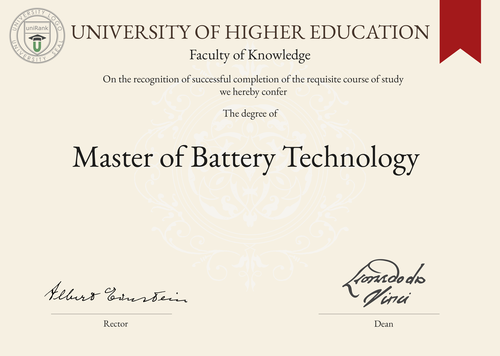
Master of Battery Technology (M.B.T.)
Guide to Master of Battery Technology Program/Course/Degree
Master of Battery Technology (M.B.T.)

Program Name
Master of Battery TechnologyProgram or Degree abbreviation
M.B.T.Duration range
The duration of the Master of Battery Technology program can vary depending on the country or university. Typically, it ranges from 1 to 2 years.Tuition range
The tuition fees for the Master of Battery Technology program can vary depending on the country or university. Generally, the range is between $10,000 and $30,000 per year.Overview
The Master of Battery Technology program is designed to provide students with in-depth knowledge and skills in the field of battery technology. This program focuses on the development, design and manufacturing of batteries, as well as their applications in various industries.Curriculum Overview by year
The curriculum of the Master of Battery Technology program is structured to cover both theoretical and practical aspects of battery technology. The coursework is divided into different modules, which are typically spread across the duration of the program. The curriculum includes subjects such as battery chemistry, energy storage systems, battery management systems, battery manufacturing processes and advanced battery technologies.Key Components
The key components of the Master of Battery Technology program include comprehensive study of battery chemistry, hands-on experience with battery manufacturing processes, understanding of battery management systems and exploration of advanced battery technologies. Students also have the opportunity to work on research projects and gain practical skills through internships or industry collaborations.Career Prospects
Graduates of the Master of Battery Technology program have excellent career prospects in the rapidly growing field of battery technology. They can pursue careers in industries such as renewable energy, electric vehicles, consumer electronics and energy storage. Job roles may include battery engineer, battery scientist, research and development specialist, battery manufacturing manager and energy storage consultant.Salary Expectations
The salary expectations for graduates of the Master of Battery Technology program can vary depending on factors such as the country, industry and job role. On average, professionals in this field can expect competitive salaries, with entry-level positions starting around $60,000 per year and experienced professionals earning upwards of $100,000 per year. For a more accurate understanding of salary expectations, you can utilize the Job Sites Search Engine, from our sister site jobRank, which searches over 4,600 job sites worldwide. Make sure to specify not only the job title but also the country you are interested in.Conclusions:
It is important to note that the duration, tuition fees, curriculum, key components, career prospects and salary expectations of the Master of Battery Technology program can vary depending on the chosen country or location of study, as well as the chosen university. Prospective students are advised to research and compare different programs and universities to find the best fit for their goals and aspirations. Visitors can search for where this specific degree, Master of Battery Technology, is offered anywhere in the world through the uniRank World Universities Search Engine.World Universities Search Engine
search for Master of Battery Technology (M.B.T.) and add the Location (country, state etc.) or specific University you are interested in studying at.
Query examples:
- Master of Battery Technology (M.B.T.) United States
- Master of Battery Technology (M.B.T.) United Kingdom online
- Master of Battery Technology (M.B.T.) Australia international students
- Master of Battery Technology (M.B.T.) University of California
- Master of Battery Technology (M.B.T.) University of London tuition fees
- Master of Battery Technology (M.B.T.) University of Sydney scholarships
Share Program/Course
Interesting? Share this program/course/degree info with your friends now.